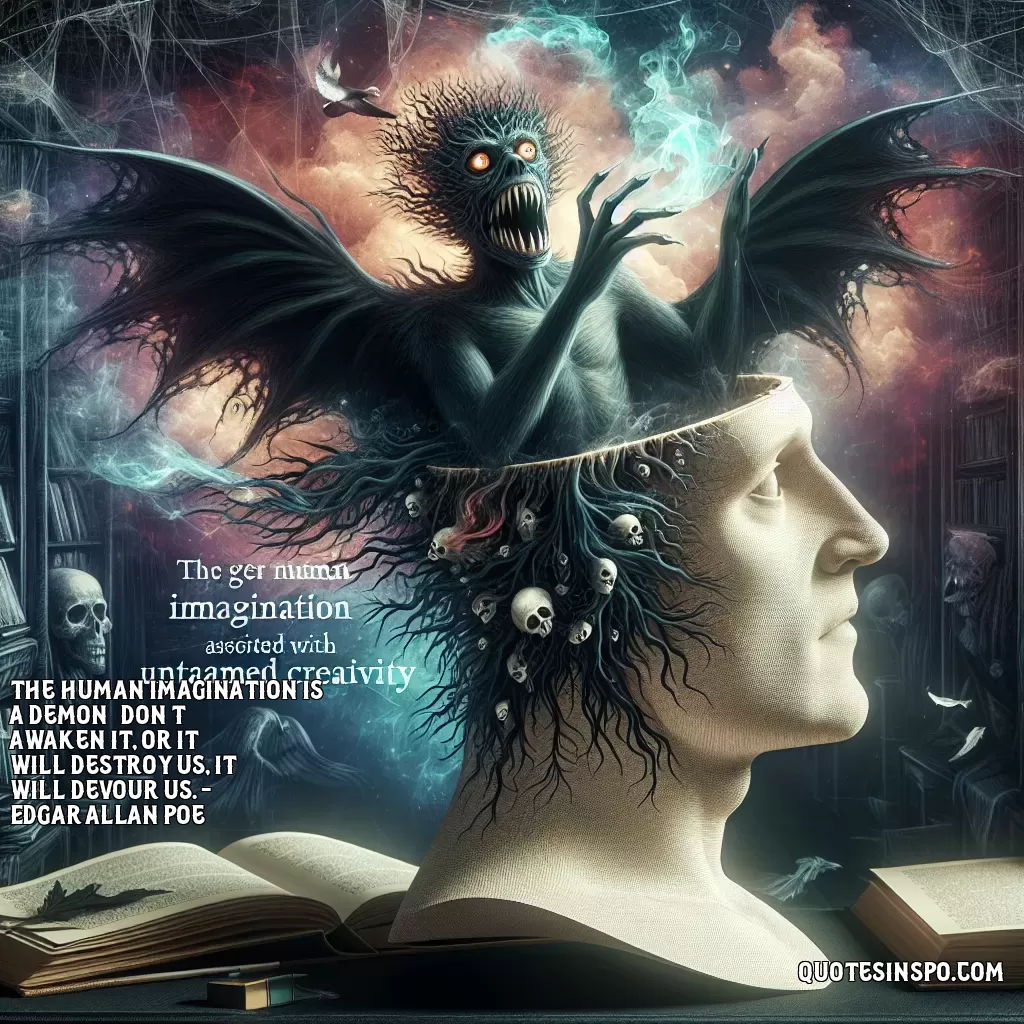
The human imagination is a demon don’t awaken it, or it will destroy us, it will devour us. - Edgar Allan Poe

The human imagination is a demon don’t awaken it, or it will destroy us, it will devour us. - Edgar Allan Poe
Edgar Allan Poe's quote, "The human imagination is a demon; don’t awaken it, or it will destroy us, it will devour us," paints a vivid picture of the dual nature of imagination. On one hand, imagination is the creative force that fuels innovation, art, and progress. However, Poe cautions against the darker side of this powerful faculty. By labeling it a "demon," he suggests that imagination can lead us down destructive paths if not controlled or guided by reason and ethics. Poe, known for his fascination with the macabre and the intricacies of the human psyche, often explored the themes of madness and obsession in his work. This quote reflects his understanding of how imagination can consume an individual, leading to a disconnect from reality. When imagination is "awakened" without restraint, it can result in fear, paranoia, and an overwhelming focus on the unreal or the worst aspects of human existence. This can manifest in personal turmoils like anxiety or paranoia, whereby the mind creates worst-case scenarios, leading to panic and despair. In a broader societal context, unchecked imagination can contribute to ideologies and narratives that, when adopted without scrutiny, can result in collective hysteria or irrational behaviors. Poe's warning serves as a reminder of the necessity to balance creativity with critical thinking and self-awareness. By acknowledging both the potential and the peril within our imaginations, we can aspire to harness this powerful human trait for constructive ends while mitigating its capacity to "devour us."
Quote By: Edgar Allan Poe
Edgar Allan Poe was an American writer, poet, editor, and literary critic, born on January 19, 1809, in Boston, Massachusetts. Widely regarded as a central figure in American literature, Poe is best known for his contributions to the genres of horror and gothic fiction. His life was marked by tragedy and hardship, which deeply influenced his work and themes.
Poe was orphaned at a young age when his father abandoned the family and his mother died of tuberculosis when he was only three years old. He was taken in by John and Frances Allan, a wealthy couple from Richmond, Virginia, although he was never formally adopted. This tumultuous relationship with his foster father, particularly over financial matters and Poe’s literary ambitions, led to a strained and contentious atmosphere in his upbringing.
Despite the challenges he faced, Poe pursued a career in writing and began publishing poetry at a young age. His first major work, "Tamerlane," was released in 1827, but it was his later tales, such as “The Tell-Tale Heart,” “The Fall of the House of Usher,” and “The Cask of Amontillado,” that solidified his reputation as a master of macabre. Edgar Allan Poe’s work often explored themes of death, decay, and the human psyche, showcasing his ability to delve into the darker sides of existence.
Poe also made significant contributions to the development of the short story as a literary form and is credited with pioneering the detective fiction genre with his story “The Murders in the Rue Morgue.” His literary criticism was sharp and influential, earning him a position as editor at several prestigious magazines.
Tragically, Edgar Allan Poe’s life was marred by personal difficulties, including struggles with alcoholism and the loss of loved ones. He died under mysterious circumstances on October 7, 1849, in Baltimore, Maryland. Despite his turbulent life, Poe's legacy endures, and his works continue to be celebrated for their imaginative quality and psychological depth. Edgar Allan Poe remains an iconic figure whose influence on literature and culture can still be felt today.